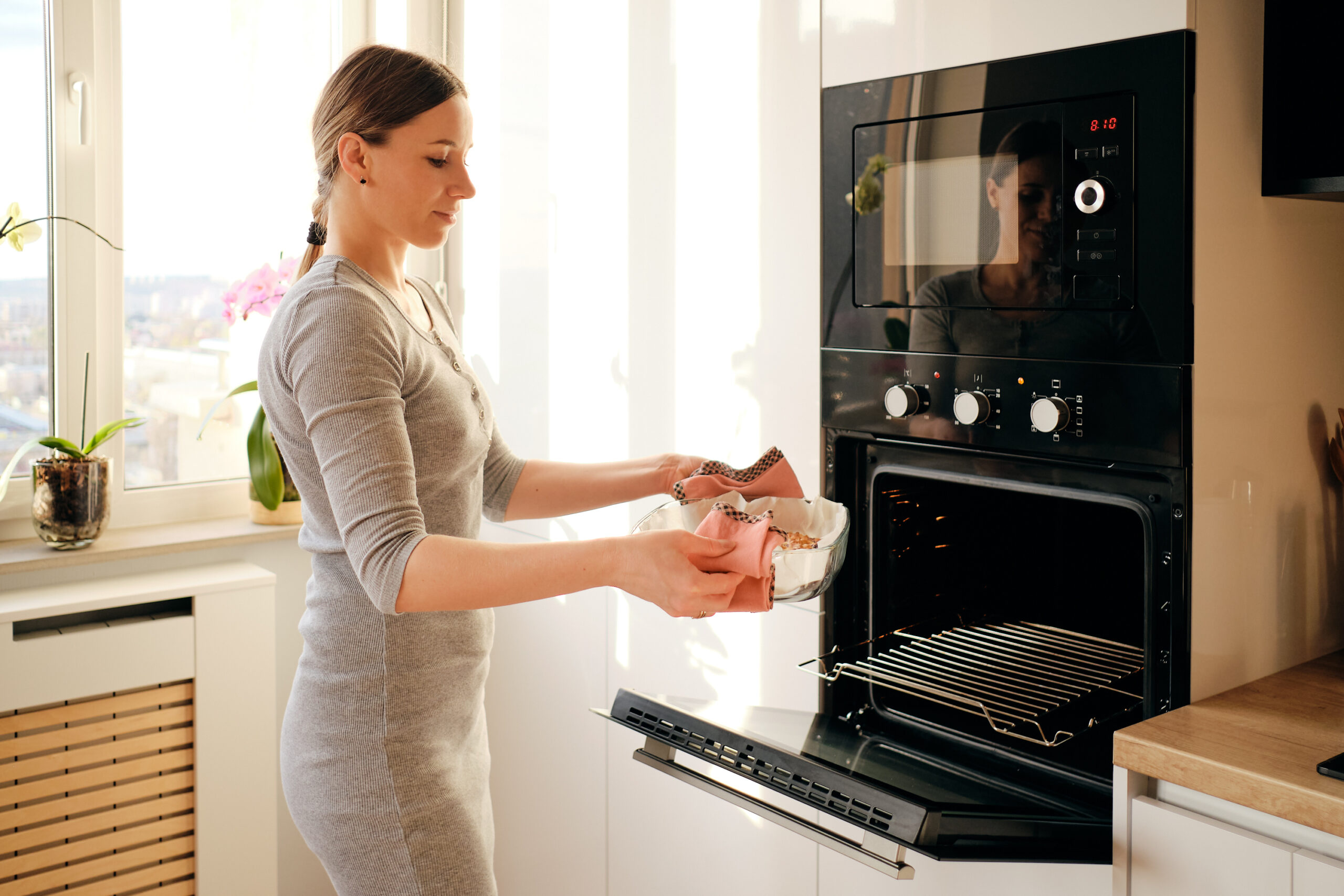When baking a delicious meal or dessert, the last thing anyone wants is for their oven to suddenly stop working. Unfortunately, this can happen to anyone, and it can be frustrating trying to figure out why it happened.
There are several reasons why an oven may stop working during cooking, and some of them are more common than others.
One possible reason an oven may stop working is due to a power outage. If the power goes out while the oven is in use, it will shut off completely. Another possibility is that the oven’s heating element has malfunctioned.
This is a common issue and can be caused by a variety of factors, such as wear and tear, electrical issues, or damage from overheating.
Additionally, if the oven’s thermostat is faulty, it may cause the oven to stop working during cooking.
Understanding the Basics of Oven Operation
An oven is an essential appliance in any kitchen. It is used for cooking, baking, and heating food. Understanding the basics of oven operation can help you troubleshoot problems that may arise.
There are two types of ovens: gas and electric. Gas ovens use natural gas or propane to heat the oven, while electric ovens use electricity. Both types of ovens have a thermostat, which controls the temperature inside the oven.
The thermostat is connected to a temperature sensor, which measures the temperature inside the oven and sends a signal to the thermostat to turn the heating element on or off.
When you turn on your oven, the heating element turns on and begins to heat the oven. The thermostat measures the temperature inside the oven and turns the heating element on or off to maintain the desired temperature.
The oven door has a seal that keeps the heat inside the oven and prevents it from escaping.
The heating element in an electric oven is usually located at the bottom of the oven, while the heating element in a gas oven is located at the top of the oven. The broiler in a gas oven is also located at the top of the oven and is used for broiling food.
In summary, an oven has a thermostat that controls the temperature inside the oven. The heating element turns on and off to maintain the desired temperature. The oven door has a seal that keeps the heat inside the oven.
Gas ovens have a heating element at the top of the oven, while electric ovens have a heating element at the bottom of the oven.
Connect with an Appliance Repair Technician
Click here to use the chatbox to speak with one of our skilled Technicians.
No in-home service calls. No appointments.
Common Reasons for Oven Failure
Electrical Issues
One of the most common reasons for oven failure is an electrical issue. If the oven is not receiving power or if there is a problem with the electrical connection, the oven will not work.
This can be caused by a tripped circuit breaker, a blown fuse, or a faulty electrical outlet.
It is important to check the electrical connection and make sure that the oven is receiving power before attempting any repairs.
Thermostat Problems
Another common reason for oven failure is a problem with the thermostat. If the thermostat is not working properly, the oven may not heat up or may overheat.
This can be caused by a faulty thermostat or a problem with the temperature sensor. It is important to check the thermostat and temperature sensor and replace any faulty parts.
Faulty Heating Elements
If the oven is not heating up properly, it could be due to a faulty heating element.
The heating element is responsible for heating up the oven and if it is not working properly, the oven will not heat up. It is important to check the heating element and replace it if necessary.
Door Seal Damage
If the oven door seal is damaged or worn out, it can cause heat to escape from the oven and prevent it from heating up properly.
This can be caused by wear and tear or damage to the seal. It is important to check the door seal and replace it if necessary.
In summary, common reasons for oven failure include electrical issues, thermostat problems, faulty heating elements, and door seal damage.
It is important to diagnose the problem correctly and replace any faulty parts to ensure that the oven is working properly.
Connect with an Appliance Repair Technician
Click here to use the chatbox to speak with one of our skilled Technicians.
No in-home service calls. No appointments.
Impact of Oven Usage and Maintenance
Inadequate Cleaning
One of the most common reasons for an oven to stop working is inadequate cleaning. When food debris and grease accumulate on the oven’s heating elements, it can cause them to malfunction. This can lead to uneven cooking, overheating, or even complete failure of the oven.
To prevent this, it is essential to clean the oven regularly. This includes wiping down the interior after each use, removing any spills or debris, and cleaning the heating elements with a soft cloth or brush. It is also important to avoid using harsh chemicals or abrasive materials that can damage the oven’s surface.
Overloading the Oven
Another factor that can cause an oven to stop working is overloading. When too many dishes are placed in the oven at once, it can cause the oven to overheat and shut down. This can also cause uneven cooking and potentially damage the oven’s heating elements.
To avoid overloading the oven, it is important to follow the manufacturer’s guidelines for maximum capacity. It is also important to leave enough space between dishes to allow for proper air circulation and even cooking.
Regular maintenance and proper usage can go a long way in preventing an oven from malfunctioning. By keeping the oven clean and avoiding overloading, users can ensure that their oven will continue to function properly for years to come.
Exploring the Role of External Factors
When an oven stops working while cooking, it can be frustrating and inconvenient. However, it’s important to understand that there are many external factors that can contribute to this issue.
In this section, we will explore two common external factors that can cause an oven to stop working: power outages and temperature fluctuations.
Power Outages
Power outages are a common issue that can cause an oven to stop working while cooking. When the power goes out, the oven will shut off and stop cooking your food.
This can be especially frustrating if you were cooking something that requires a long cook time, such as a roast or a casserole.
To prevent this issue, it’s important to have a backup plan in case of a power outage. This can include using a generator or having a backup cooking method, such as a gas grill or stovetop.
Connect with an Appliance Repair Technician
Click here to use the chatbox to speak with one of our skilled Technicians.
No in-home service calls. No appointments.
Temperature Fluctuations
Another external factor that can cause an oven to stop working while cooking is temperature fluctuations. If the oven is not able to maintain a consistent temperature, it may shut off or stop cooking your food properly.
There are several factors that can cause temperature fluctuations in an oven, including:
- A faulty thermostat
- A broken heating element
- A malfunctioning control board
To prevent this issue, it’s important to have your oven serviced regularly by a professional. This can help identify and fix any issues before they become a problem.
In conclusion, external factors such as power outages and temperature fluctuations can cause an oven to stop working while cooking. By understanding these factors and taking steps to prevent them, you can ensure that your oven continues to work properly and cook your food to perfection.
Professional Assessment and Repair
When to Call a Professional
If your oven has stopped working while cooking, it may be time to call a professional. Here are a few signs that indicate you need professional help:
- The oven is not heating up at all.
- The oven is heating up, but not to the desired temperature.
- The oven is making strange noises.
- The oven is emitting strange smells.
If you notice any of these signs, it is important to call a professional to assess the situation. Attempting to fix the oven yourself can be dangerous and may cause further damage.
Connect with an Appliance Repair Technician
Click here to use the chatbox to speak with one of our skilled Technicians.
No in-home service calls. No appointments.
Cost of Repair vs Replacement
When deciding whether to repair or replace your oven, it is important to consider the cost. In general, if the cost of repair is more than 50% of the cost of a new oven, it is usually more cost-effective to replace the oven.
However, if the oven is still under warranty, it may be more cost-effective to have it repaired. Additionally, if the oven is a high-end model, it may be worth repairing even if the cost of repair is high.
It is important to consult with a professional to determine the best course of action. They can provide an estimate for the cost of repair and help you compare that to the cost of a new oven.
Connect with an Appliance Repair Technician
Click here to use the chatbox to speak with one of our skilled Technicians.
No in-home service calls. No appointments.
Related Articles
- Oven Not Starting But Stove Burners Working (Answered)
- Catalytic vs Pyrolytic Oven; Pros and Cons of Both
- Euro Pro Toaster Oven Not Heating Up (Answered)
References
- Image by ArthurHidden on Freepik

